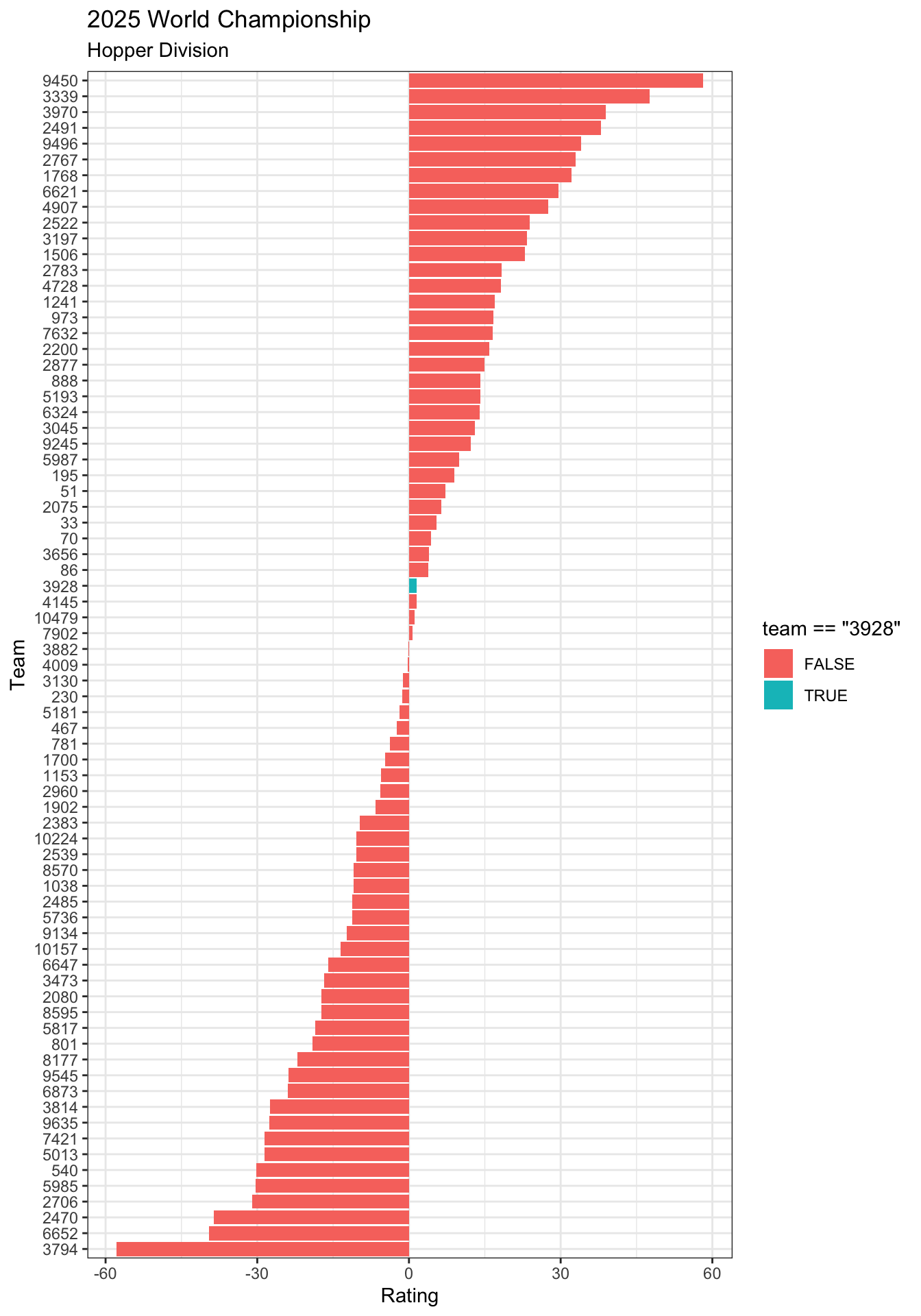<- function (probability, sim) {# Match 1 <- runif (1 )<- ifelse (u1 < probability[1 ,8 ], 1 , 8 )<- ifelse (u1 < probability[1 ,8 ], 8 , 1 )# Match 2 <- runif (1 )<- ifelse (u2 < probability[4 ,5 ], 4 , 5 )<- ifelse (u2 < probability[4 ,5 ], 5 , 4 )# Match 3 <- runif (1 )<- ifelse (u3 < probability[2 ,7 ], 2 , 7 )<- ifelse (u3 < probability[2 ,7 ], 7 , 2 )# Match 4 <- runif (1 )<- ifelse (u4 < probability[3 ,6 ], 3 , 6 )<- ifelse (u4 < probability[3 ,6 ], 6 , 3 )# Match 5 <- runif (1 )<- ifelse (u5 < probability[match1_loser, match2_loser], match1_loser, match2_loser)<- data.frame (number = ifelse (u5 < probability[match1_loser, match2_loser], match2_loser, match1_loser),round = 2 # Match 6 <- runif (1 )<- ifelse (u6 < probability[match3_loser, match4_loser], match3_loser, match4_loser)<- exit_round |> rbind (data.frame (number = ifelse (u6 < probability[match3_loser, match4_loser], match4_loser, match3_loser),round = 2 # Match 7 <- runif (1 )<- ifelse (u7 < probability[match1_winner, match2_winner], match1_winner, match2_winner)<- ifelse (u7 < probability[match1_winner, match2_winner], match2_winner, match1_winner)# Match 8 <- runif (1 )<- ifelse (u8 < probability[match3_winner, match4_winner], match3_winner, match4_winner)<- ifelse (u8 < probability[match3_winner, match4_winner], match4_winner, match3_winner)# Match 9 <- runif (1 )<- ifelse (u9 < probability[match6_winner, match7_loser], match6_winner, match7_loser)<- exit_round |> rbind (data.frame (number = ifelse (u9 < probability[match6_winner, match7_loser], match7_loser, match6_winner),round = 3 # Match 10 <- runif (1 )<- ifelse (u10 < probability[match5_winner, match8_loser], match5_winner, match8_loser)<- exit_round |> rbind (data.frame (number = ifelse (u10 < probability[match5_winner, match8_loser], match8_loser, match5_winner),round = 3 # Match 11 <- runif (1 )<- ifelse (u11 < probability[match7_winner, match8_winner], match7_winner, match8_winner)<- ifelse (u11 < probability[match7_winner, match8_winner], match8_winner, match7_winner)# Match 12 <- runif (1 )<- ifelse (u12 < probability[match10_winner, match9_winner], match10_winner, match9_winner)<- exit_round |> rbind (data.frame (number = ifelse (u12 < probability[match10_winner, match9_winner], match9_winner, match10_winner),round = 4 # Match 13 <- runif (1 )<- ifelse (u13 < probability[match12_winner, match11_loser], match12_winner, match11_loser)<- exit_round |> rbind (data.frame (number = ifelse (u13 < probability[match12_winner, match11_loser], match11_loser, match12_winner),round = 5 # Finals <- runif (1 )<- ifelse (uf_1 < probability[match11_winner, match13_winner], match11_winner, match13_winner)<- runif (1 )<- ifelse (uf_2 < probability[match11_winner, match13_winner], match11_winner, match13_winner)if (! (final_game1_w == final_game2_w)) {<- runif (1 )<- ifelse (uf_3 < probability[match11_winner, match13_winner], match11_winner, match13_winner)<- ifelse (! exists ("final_game3_w" ), final_game2_w, final_game3_w)<- setdiff (c (match11_winner, match13_winner), winner)<- exit_round |> rbind (data.frame (number = c (runnerup, winner),round = c (6 ,7 )$ sim = simreturn (exit_round)# Large number of simulations <- 1000 <- list ()for (i in 1 : n_sims) {<- simulate_playoffs (probability, i)<- bind_rows (exit_round) |> select (sim, round, number) |> arrange (sim, round, number)